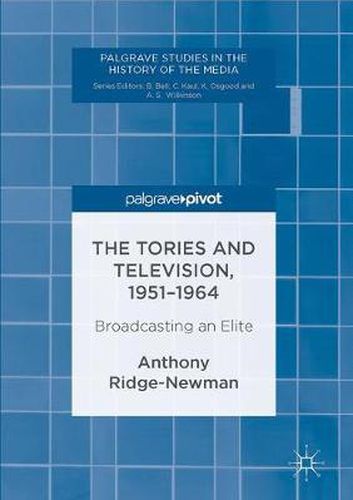Readings Newsletter
Become a Readings Member to make your shopping experience even easier.
Sign in or sign up for free!
You’re not far away from qualifying for FREE standard shipping within Australia
You’ve qualified for FREE standard shipping within Australia
The cart is loading…






This title is printed to order. This book may have been self-published. If so, we cannot guarantee the quality of the content. In the main most books will have gone through the editing process however some may not. We therefore suggest that you be aware of this before ordering this book. If in doubt check either the author or publisher’s details as we are unable to accept any returns unless they are faulty. Please contact us if you have any questions.
This book explores the role of television in the 1950s and early 1960s, with a focus on the relationship between Tories and TV. The early 1950s were characterized by recovery from war and high politics. Television was a new medium that eventually came to dominate mass media and political culture. But what impact did this transition have on political organization and elite power structures? Winston Churchill avoided it; Anthony Eden wanted to control it; Harold Macmillan tried to master it; and Alec Douglas-Home was not Prime Minister long enough to fully utilize it. The Conservative Party’s relationship with the new medium of television is a topic rich with scholarly questions and interesting quirks that were characteristic of the period. This exploration examines the changing dynamics between politics and the media, at grassroots and elite levels. Through analysing rich and diverse source materials from the Conservative Party Archive, Anthony Ridge-Newman takes a case study approach to comparing the impact of television at different points in the party’s history. In mapping changes across a thirteen year period of continual Conservative governance, this book argues that the advent of television contributed to the party’s transition from a membership-focused party to a television-centric professionalized elite.
$9.00 standard shipping within Australia
FREE standard shipping within Australia for orders over $100.00
Express & International shipping calculated at checkout
This title is printed to order. This book may have been self-published. If so, we cannot guarantee the quality of the content. In the main most books will have gone through the editing process however some may not. We therefore suggest that you be aware of this before ordering this book. If in doubt check either the author or publisher’s details as we are unable to accept any returns unless they are faulty. Please contact us if you have any questions.
This book explores the role of television in the 1950s and early 1960s, with a focus on the relationship between Tories and TV. The early 1950s were characterized by recovery from war and high politics. Television was a new medium that eventually came to dominate mass media and political culture. But what impact did this transition have on political organization and elite power structures? Winston Churchill avoided it; Anthony Eden wanted to control it; Harold Macmillan tried to master it; and Alec Douglas-Home was not Prime Minister long enough to fully utilize it. The Conservative Party’s relationship with the new medium of television is a topic rich with scholarly questions and interesting quirks that were characteristic of the period. This exploration examines the changing dynamics between politics and the media, at grassroots and elite levels. Through analysing rich and diverse source materials from the Conservative Party Archive, Anthony Ridge-Newman takes a case study approach to comparing the impact of television at different points in the party’s history. In mapping changes across a thirteen year period of continual Conservative governance, this book argues that the advent of television contributed to the party’s transition from a membership-focused party to a television-centric professionalized elite.